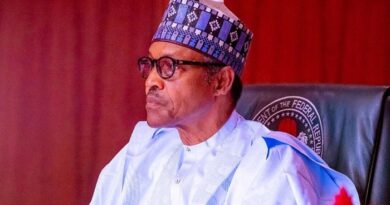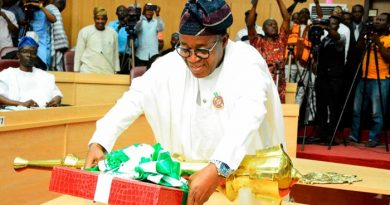Attacks: IGP tightens security at INEC offices nationwide
Inspector-General of Police, Mr Usman Baba, has ordered that security be beefed up around all facilities of the Independent National Electoral Commission (INEC) in the country.
Baba gave the order to the Commissioners of Police in all the 32 states of the country, including the Federal Capital Territory (FCT), Abuja.
The directive followed the brazen attack on the facilities of INEC in both Ogun and Osun states on Thursday by yet-to-be-identified arsonists.
The criminals, wanted by the police, destroyed thousands of permanent voter cards awaiting collections during the attack on the state’s offices of the electoral body.
It was gathered that a total of 65,699 PVCs, 904 ballot boxes, 29 voting cubicles, 30 megaphones, 57 election bags and eight electric power generators were destroyed and damaged in Ogun by the suspected hoodlums.
In Osun, a portion of the INEC’s office was razed by the arsonists.
Police spokesperson, Muyiwa Ogunjobi, who relayed the directive of the IGP, said the order was part of measures to prevent another attack on the properties of the electoral body.
“The directive given by the Inspector-General of Police, Usman Baba, to officers is that they must protect all INEC facilities. Hence, it is for the Commissioners of Police in the states to design how best they can protect INEC facilities within their Commands,” he told PUNCH.
“The IGP cannot go to every state to get that done. This is non-negotiable, the IGP has given that leadership platform, directive, and the strategic clues for them to deploy, so we expect every Commissioner of Police to fortify INEC facilities in their areas of responsibility,” Mr Ogunjobi added.
He explained further that the IGP also gave a marching order to the commissioners to ensure the arrest of culprits involved in the attacks on INEC’s facilities.
In less than five months, Nigerians would go to the polls to exercise their franchise and vote for the country’s next leader, who would succeed president Muhammadu Buhari.
The country’s electoral body has fixed February 25, 2023, for the presidential election and 18 political parties have fielded candidates for the election.
That of governorship and state Houses of Assembly would be held on March 11, 2023.
Meanwhile, the National Chairman of INEC, Mr Mahmood Yakubu, has said the attacks on the facilities of the electoral body would not stop the conduct of the 2023 elections.
Yakubu, however, warned that if urgent steps were not taken, the attacks would intensify as the country prepares for next year’s election.
“As we have stated on several occasions, election is a multi-stakeholder activity involving not just INEC and the security agencies. The political class plays perhaps the most critical role in ensuring peaceful elections. We must all rise to the occasion. Nigerians are watching us. The world is watching us. We must never disappoint them.
“The commission wishes to reassure Nigerians that we remain committed to delivering credible elections in spite of the challenges. The attempt to sabotage or weaken our resolve will not deter us from conducting transparent elections in which only the votes cast by Nigerians on Election Day will determine winners of elections,” he said on Friday.
He demanded the immediate arrest and prosecution of those behind the attacks on INEC facilities, stressing that a peaceful campaign was critical for the success of the election.
“It is important that we move swiftly to apprehend perpetrators, prosecute them as required by law and reinforce security around election officials and electoral infrastructure around the country,” Mr Yakubu added.
According to him, the electoral body was taking steps to repair the damaged buildings and replace the burnt PVCs.
In October 2022, Yakubu had projected that 95 million Nigerians would vote in 176, 846 polling units across the country in the 2023 general election.
“There are 18 political parties in the race to produce the next President to be elected by 95 million voters. We had over 84 million registered voters in 2019.
“But with the last Continuous Registration of Voters (CVR), we are going to add at least 10 million Nigerians and that will take the Register of Voters to 95 million. And these 95 million citizens will vote in 176, 846 polling units,” he said at an event held in the U.S.
The event was organised by the National Endowment for Democracy (NED) and the International Foundation for Electoral Systems (IFES).
With the resurgence of arson targeted at the INEC offices and the destruction of critical assets and properties for the successful conduct of the 2023 general election, Nigerians fear a volatile electioneering season as the nation begins the countdown to the polls.




